|
|
|
Sort Order |
|
|
|
Items / Page
|
|
|
|
|
|
|
| Srl | Item |
| 1 |
ID:
099602
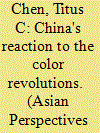

|
|
|
| 2 |
ID:
113974
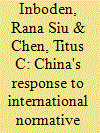

|
|
|
|
|
| Publication |
2012.
|
| Summary/Abstract |
Over the past three decades, the People's Republic of China's response to international human rights pressure has been guided by its strong state identity, an identity that has prioritised the pursuit of economic productivity, material power and international prestige. The goal of a strong socialist state led Beijing to participate in the UN human rights regime for strategic and diplomatic gains, and later to endorse human rights norms that were perceived as consistent with them. Accordingly, the PRC sees colonialism, imperialism, hegemonism, and racism as key human rights violations, while opposing the universality of human rights and rejecting intrusive human rights monitoring, deemed as detrimental to its strong state goal. After the 1989 Tiananmen Square protests, China faced unprecedented international pressure and responded by challenging aspects of the human rights system. During negotiations to replace the UN Commission on Human Rights with the Human Rights Council, China again sought to shield itself from human rights pressure, primarily by challenging country specific approaches. Thus, instead of the normative influence leading to norm-compliant behaviour, China has sought to diminish human rights pressure and shape international human rights institutions in ways that are advantageous to its state interests.
|
|
|
|
|
|
|
|
|
|
|
|
|
|
|
|
| 3 |
ID:
130615
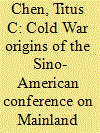

|
|
|
|
|
| Publication |
2014.
|
| Summary/Abstract |
this article adopts a reflexive approach to investigate the history of the Sino-American Conference on mainland China (SACMC), the Cold War precursor of the Taiwan - US Conference on contemporary China (TUSCCC) organized and hosted by the institute of international relations (IIR) of the republic of China , the Cold war origins of the SACMC demonstrate the nation that power and knowledge- the practice of politics and theory of politics are asymmetrically and symbiotically co-constitute.
|
|
|
|
|
|
|
|
|
|
|
|
|
|
|
|
| 4 |
ID:
159913


|
|
|
|
|
| Summary/Abstract |
What does human rights mean to the Chinese government in the post-Tiananmen era? Has the way by which Beijing conceptualizes human rights changed over time? What policies and practices have Beijing’s human rights conception privileged or delegitimized? The article takes on these intriguing questions by analyzing human rights stories in the People’s Daily. The research applies the methods of text analytics and discourse analysis to shed light on the Party-state’s effort of incorporating and reformulating the idea of human rights. It is found that, since 1989, the Chinese government has developed two major conceptions of human rights. Throughout the 1990s, human rights had been understood mainly as a source of regime threat and insecurity, hence requiring containment and rejection. Beginning in the early 2000s, an alternative argument was constructed that conceptualizes human rights as the governing capacity of the Party-state, hence deserving reception and acclamation. The rights-as-capacity argument has developed side-by-side with the rights-as-threat conception, resulting in an illiberal and dualistic rights regime in Chinese politics.
|
|
|
|
|
|
|
|
|
|
|
|
|
|
|
|
| 5 |
ID:
180527
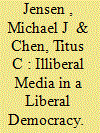

|
|
|
|
|
| Summary/Abstract |
The regime of censorship in the People’s Republic of China (PRC) extends beyond its borders through the extraterritorial application of its media regulations to popular social media platforms like WeChat. This research investigates the effects of the PRC’s extraterritorial control of online content on the identity narratives and norms communicated by comparing Australia’s Special Broadcast Service (SBS) Mandarin language news and the news targeting Australian audiences published on popular WeChat Official Accounts (OAs). We find significant differences in the news content between these two platforms: SBS provides more political content and a focus on political and cultural integration, while WeChat pages tend to avoid political topics that are not otherwise press releases from the PRC and they encourage strong cultural ties with Mainland China. Finally, SBS tends to both inform and cultivate democratic political identities and identification with the Australian political system, whereas WeChat tends to differentiate the Chinese diaspora from the wider Australian community. We situate these findings within a wider understanding of PRC’s national security strategies and doctrine. Whether by requirement or practice, not only the WeChat OAs in Australia implement PRC’s communication controls, but the content on these pages also challenges the liberal democratic practices and norms and supports foreign influence and espionage in Australia.
|
|
|
|
|
|
|
|
|
|
|
|
|
|
|
|
| 6 |
ID:
112439
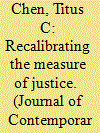

|
|
|
|
|
| Publication |
2012.
|
| Summary/Abstract |
This article seeks to explain contradictions that have abounded in China's judicial reform, i.e. the juxtaposition of liberal and authoritarian characteristics. Incompatible phenomena came about because the post-1999 judicial reform has failed to rein in local and departmental resistance in key issue areas. China's national principals accepted the judicial system's policy prescription of administering the country by law, with an aim to reclaim central control over local state agents. However, the national leadership's varying political support to different aspects of judicial reform resulted in uneven outcomes and frustrated the goal of judicial centralization. In order to secure the goal, the national leadership has, since 2006, reinstituted more authoritarian policy imperatives into the existing liberal framework of judicial reform. China's post-1999 judicial reform has therefore oscillated between merit-based professionalism and allegiance-oriented demand. Conceptual incompatibility eventually led to behavioral contradictions and delivered mixed signals.
|
|
|
|
|
|
|
|
|
|
|
|
|
|
|
|
|
|
|
|
|